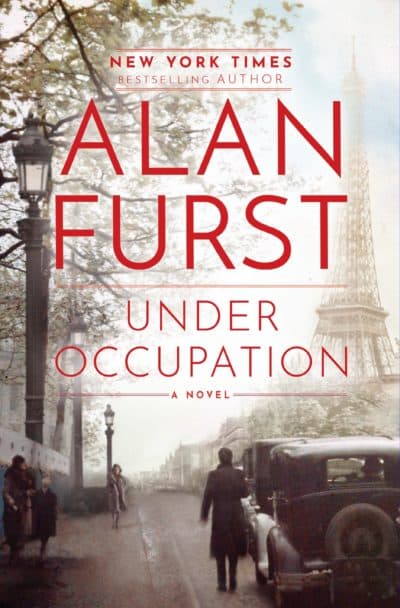Advertisement
Acclaimed Spy Novelist Alan Furst Takes Up Nazi Resistance In 1942 Paris
ResumeA conversation with the master of the historical spy novel, Alan Furst.
Guest
Alan Furst, widely recognized as the master of the historical spy novel. Author of "A Hero of France," "Midnight in Europe," "Mission to Paris," and many other bestsellers. His new book is "Under Occupation."
From The Reading List
Excerpt from "Under Occupation" by Alan Furst
Hurrying down the rainswept Rue Condé, Ricard wore a battered felt hat and a khaki-colored trench coat. At forty, he had a moderately handsome face but was no movie star. Still, women were greatly attracted to him; he was smart and funny and kind, with one particularly appealing feature: he had green eyes, a deep, rich green, knowing eyes, intelligent eyes. He had also a naturally seductive voice, quiet and assured and just deep enough.
At the age of twenty he had left the Sorbonne—he would not become a lawyer or a teacher. His father had died the same year, and his mother, rather too quickly, remarried. Alone and without much money, he decided to do what he wanted, to be a journalist, and found his subjects wherever he could. For example, a recently acquired Velázquez painting, an Adoration of the Magi, was now on exhibition at the Louvre. At the Crêperie Jules, on the Rue de Rennes, some of the best crêpes in Paris, generously stuffed with scrambled eggs and ham. The beloved Hungarian film actress Beáta Markozy, last seen in Love for One Night, was in town to sign a contract for a new movie and was staying at the Hôtel Bristol.

And he haunted the courts: the Delaunay gang of bank robbers captured at last; the widow Robet, who poisoned her husband for his life insurance; the assassination of the Serbian consul in Bordeaux—Balkan politics? No, an affaire d’amour, though when the spurned lover went to the guillotine, Ricard stayed home. That he did not need to see.
Ricard sold many of his articles to small Parisian weeklies for a few francs, no more. But some of what he witnessed captured his imagination. Not so much the jealous lovers, not so much the scheming postal clerks, not the pistol-waving robbers or the embezzling bank presidents; it was the political crimes that drew his interest. When the poet Azerbajian cried out “Armenia will never die!” as he fired his revolver at the foreign minister, Ricard wanted more. What was the story here? Who were these fiery rebels who gathered at a café in the Seventeenth Arrondissement?
There was, he realized, a novel in this, yes, a detective novel in form but pitched higher, for the sophisticated reader who wanted more than a detective with a cold waiting for a train. Thus, in 1934, a year of Stalinist purges, was born L’Affaire Odessa, The Odessa Affair, the hero a minor journalist, Roquette, hunted in the streets of Paris by Soviet secret agents. The cover was lurid—colorful portraits of Roquette, Sauvard of the Deuxième Bureau, the mysterious Ludmila, the secret agent Mischkin. The book sold well; the publisher said, “When may we expect another?”
Excerpt from UNDER OCCUPATION by Alan Furst, copyright © Alan Furst. Used by permission of Random House, an imprint and division of Penguin Random House LLC. All rights reserved. No part of this excerpt may be reproduced or reprinted without permission in writing from the publisher.
New York Times: "Alan Furst: By the Book" — "What books are currently on your night stand?
"I’m reading Sheila Hale’s magnificent 'Titian: His Life,' a biography of the great painter of the Italian Renaissance. What I especially like about the book is that it is also a dense history (I like my history dense) of Venice in the 16th century: kings, doges, emperors, popes, Ottoman invasions, the Medicis — all the erotic pursuits, art-world gossip and political conspiracy you could want. It is also the story of Venice, and how a great city fought for survival.
Waiting for me just below Titian is Patrick Leigh Fermor’s 'The Broken Road,' which followed, by decades, 'A Time of Gifts' and 'Between the Woods and the Water.' These would have to be shelved in the travel writing section, I suppose, but they are transcendent works, narratives of Leigh Fermor’s walk across Europe in the early 1930s — descriptions of lands and their people in the most elegant, beautiful prose to be found anywhere.
"Who’s your favorite novelist of all time?
"Years ago, I developed a grand passion for the novels of Anthony Powell. I tried, at a friend’s insistence, 'A Dance to the Music of Time.' Couldn’t do it. Then I tried again, still couldn’t. But then, a year later, poking aimlessly about in my library, I paged through the books and came upon the 'Autumn' section, Book 3, which includes the World War II novels: 'The Valley of Bones,' 'The Soldier’s Art' and 'The Military Philosophers.' Now the hook set. Going back to the beginning after reading 'Autumn,' it all made sense: the interwoven lives of cosmopolitan British men and women, tossed about by the times they lived through. Powell does everything a novelist can do, from flights of aesthetic passion to romance to comedy high and low. His dialogue is extraordinary; often terse, pedestrian and perfect, each character using three or four words. Anthony Powell taught me to write; he has such brilliant control of the mechanics of the novel. Somewhere in his autobiography, he remarks that a character, when asked a question by another character, need not answer it. I remember sitting there for a long time and letting the stylistic implications of this sink in."
Newsweek: "Alan Furst's Characters Face a Choice: Collaborate or Resist Facism" — "Like a Michelin-starred chef or a composer of classical music, the spy novelist Alan Furst is an expert at developing variations on a theme. In his case, the theme is a morally weighted question: What would you do? Mathieu, the protagonist of Furst's new novel, A Hero in France, fights against the German invaders in 1940 and then decides to join the Resistance rather than live passively under Nazi tyranny, as some French chose to do.
"'The book is about these upper-middle-class people who decided to fight back against the Germans,' says Furst, speaking from his home in Sag Harbor on the east end of New York's Long Island. 'They could ignore it, but they don't. There is moral compulsion—you watch something wrong going on, and one day you feel you have to do something about it. Or you don't.'
"A Hero in France is Furst's 14th novel about spies and wartime Europe. Some share a cast of minor characters. All of the books return to Furst's core interest. 'They are anti-fascist books,' he says. 'They are about people who don't like authoritarian rule. They don't like living in tyranny, and they try to strike back against it.'
"Furst was born in 1941—too young to remember World War II. But he grew up on Manhattan's Upper West Side, an area with a large Jewish population that was shaped in part by the fresh, collective memory of a titanic, life-or-death struggle between good and evil—a struggle that continually demanded the sort of choices that captivate Furst. Resist or collaborate? Take a stand and risk everything or submit?"
This program aired on November 8, 2019.
